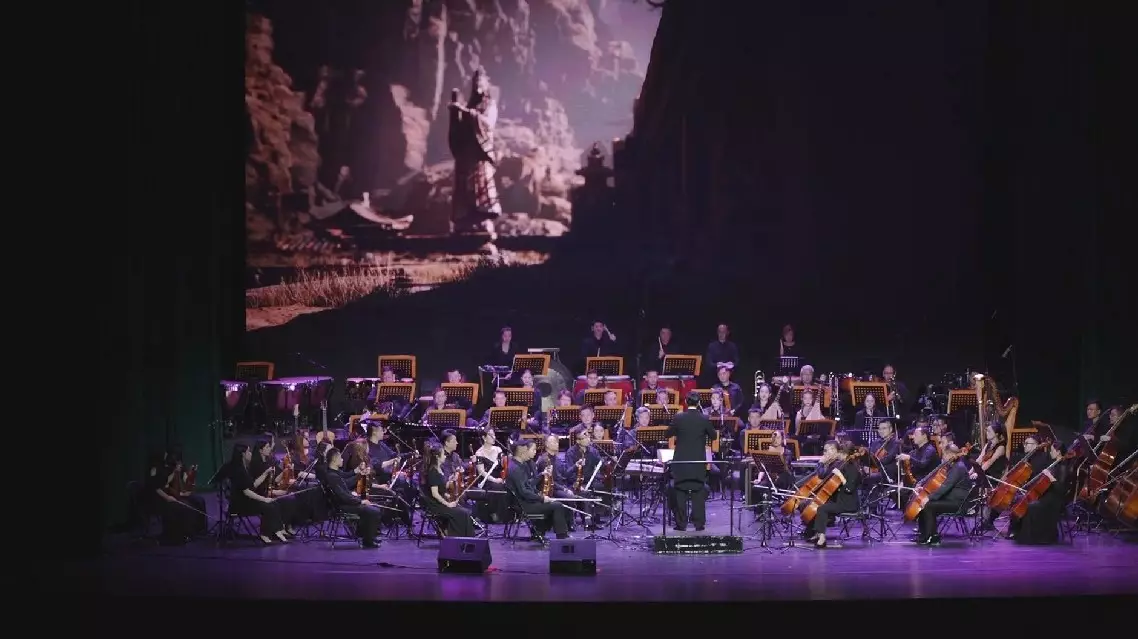A concert featuring the soundtracks from the popular action role-playing game "Black Myth: Wukong" has left many audiences in Beijing in awe, drawing attention to the rich cultural heritages the game embodies by showcasing a harmonious blend of different musical styles.
Inspired by the classic novel "Journey to the West" the recently-released game "Black Myth: Wukong" has captivated players worldwide with its gripping gameplay, advanced graphics and stirring soundtrack.
As part of a national tour jointly organized by the game's developer Game Science and entertainment giant the Poly Culture Group, the concert series wrapped up earlier this month at the Beijing Exhibition Theater, after infusing modern elements into traditional melodies.
As the music began, the audience was transported into the game's enchanting universe, with the concert peaking with a performance by Xiong Zhuying of "Shanbei Storytelling", a much-loved folk music style from Shaanxi Province in northwest China which features in the game.
The piece, which runs for less than two minutes, quickly went viral globally, and is one of the main reasons many audience members opted to attend the concert.
"Actually, it has generated significant buzz among music critics both in China and abroad. This reflects the growing confidence in our cultural exports," said Zhu Qiuyu, an audience member.
Xiong himself noted that before his involvement with 'Black Myth: Wukong,' he was unsure if young people would appreciate folk music. Now, the long rounds of applause and palpable excitement have more than answered his question.
"It has made many young people fall in love with traditional culture, particularly the storytelling style from northern Shaanxi Province. I believe that we could continue to boldly experiment with more forms of integration, encouraging more young people to participate," he said.
Others point to the wide appeal of the music in the game which draws on a range of styles and influences.
"After listening to [the music in] 'Black Myth: Wukong,' many audience members may notice that it combines Western symphonic elements with traditional Chinese folk instruments. This crossover between gaming and art, as well as the fusion within the music itself, leaves them with a very strong impression," said Yao Rui, chairman of Poly Performance and Culture Development Company.
As the person responsible for composing the game's soundtrack, Zhai Jinyan explained how the team came up with a suitable style to match the moody world depicting in the story.
"I believe the most important aspect is the blend of modern musical styles that people are familiar with and traditional Chinese folk music. This includes orchestral arrangements, powerful and epic percussion, and certain electronic synthesizer sounds," Zhang said.
Conductor Li Bowei described the concert as a unique experience, which came following the whirlwind success of the game.
"This concert is for games and gamers, so it's less serious and more interesting so I think that was a special one for the band and conductors," he said.
Singer Gao Tianhe believed that the concert has expanded the audience for classical music, attracting newcomers who might not have shown interest in the art form before.
"Such concerts actually expand the market and audience for classical music. They are attracting new audiences who don't usually follow classical music, encouraging them to visit theaters and experience the art form. This increases the number of art enthusiasts and allows the brilliance of our classical arts to reach and inspire more people," said Gao.
For pianist Tim Zhang who grew up overseas, the concert offered him a chance to explore Chinese culture more deeply, and he expressed great pride at being a part of the project.
"For one, I'm super proud to be part of this project. I've never played a game that has Chinese culture and Chinese influence. So I feel like this is a great start. I'm so proud that everybody around the world will be able to know a little bit about Chinese culture [and] Chinese traditional music," said Zhang.

Concert featuring music of popular 'Black Myth: Wukong' computer game delights crowds









